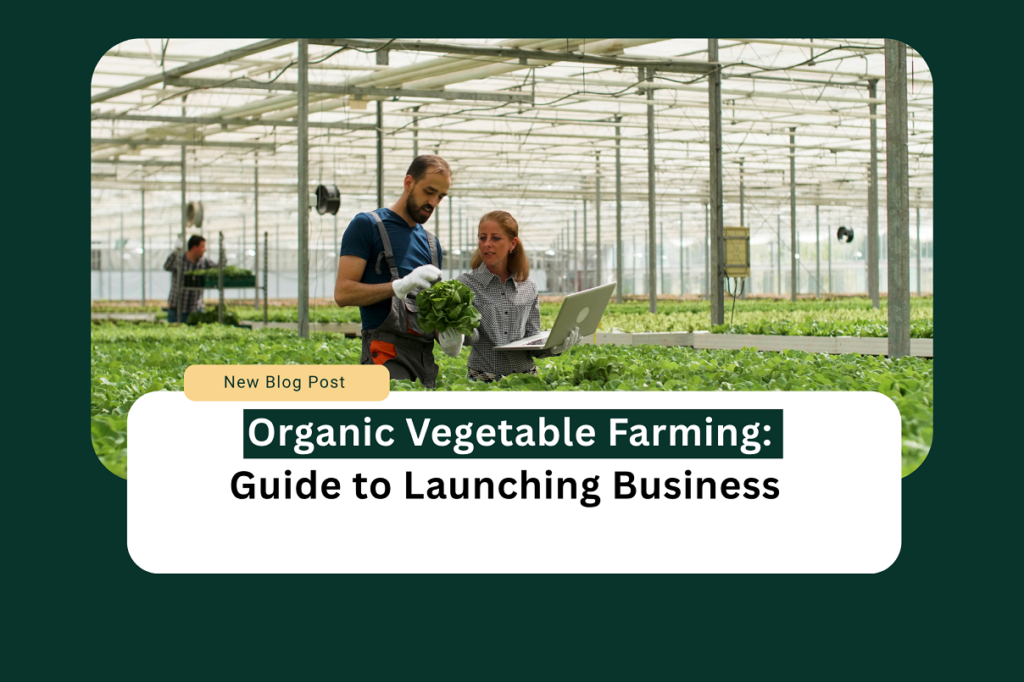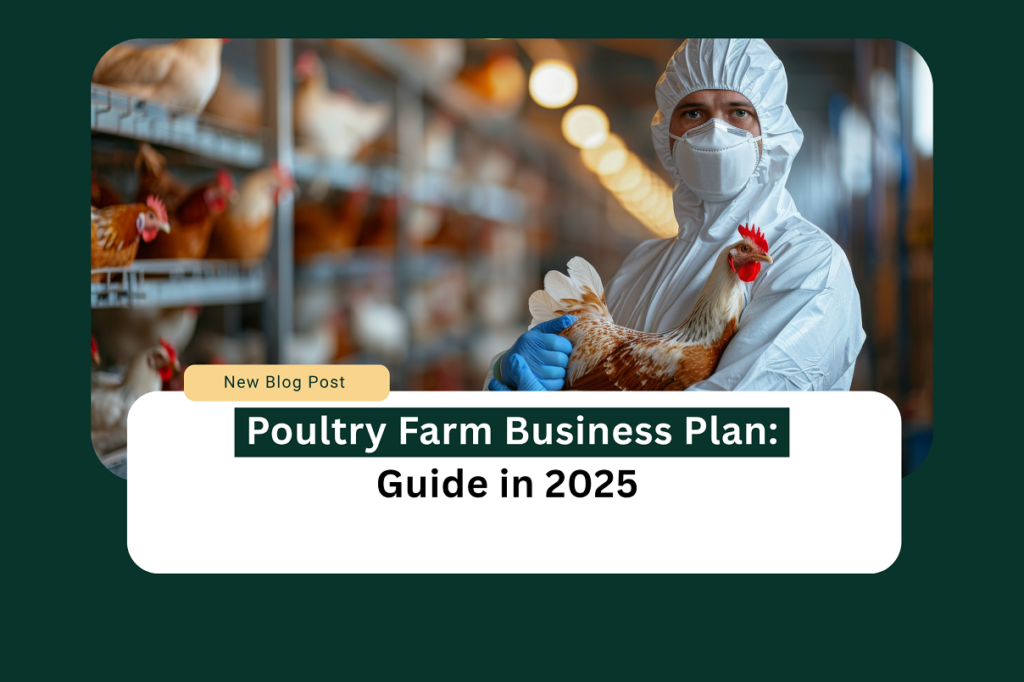Introduction
Business success in organic vegetable farming begins with creating an all-encompassing strategic plan. U.S. organic food sales achieved their highest point at $56.5 billion in 2022 while demonstrating a doubling rate compared to conventional food sales growth rates. The exceptional market growth demonstrates a substantial business opportunity for entrepreneurs who want to enter organic agriculture. The implementation of an effective organic vegetable farming business plan helps both experienced farmers making organic transitions and newcomers to agriculture succeed in sustainable food production while achieving financial stability in a rising competitive market.
Organic vegetable market research
You need to grasp the existing marketplace conditions before writing your organic vegetable farming business plan. Organic food purchases have experienced growing demand among U.S. households because 83% of them buy organic products at least sometimes, according to the Organic Produce Network. The market transition stems from two major drivers, which include health-conscious customers who want pesticide-free produce along with environmentally-minded buyers.
Your business plan for organic vegetable farming must begin with market research to determine targeted demographic groups and competitive local vendors and product pricing frameworks. Organic farming operations that succeed best select specific market segments that match regional food tastes and local climate characteristics. Research by the Hartman Group demonstrates that consumers now pay higher prices for unique organic vegetables that grow locally and possess distinct tastes or health benefits unavailable through regular supermarkets.
A successful organic vegetable farming business plan requires essential elements for its implementation.
A complete organic vegetable farming business plan requires several essential components to bring in investors and direct operational choices. Your business plan should start with an executive summary that presents your farm’s mission, vision, and distinctive value proposition concisely.
Follow this with detailed sections covering your production methodology, marketing strategy, financial projections, and management structure.
The certification strategy for your organic vegetable farming business needs to appear clearly in your business plan. For smaller operations the Certified Naturally Grown certification provides a better alternative than USDA Organic because it carries reduced administrative requirements along with lower costs. Your business planning must incorporate the three-year transition period for organic certification specified by the USDA National Organic Program since farmers need to practice organic methods before certification.
Financial Planning for Organic Vegetable Operations
Your organic vegetable farming business plan requires a financial section to be its most vital part. The financial projections start with expected crop yields alongside market prices and distribution methods as their base. The USDA Economic Research Service shows that organic vegetable farms certified through their program typically need 44% more operating expenses than conventional farms yet they sell their products for prices that exceed conventional rates by 30-50% which creates equal or better profitability as long as operations run efficiently.
Your plan for starting an organic vegetable farm needs to specify the costs of buying land or leasing it and the expenses for equipment and organic certification and the necessary starting capital. The business needs to precisely forecast all continuous costs including seeds as well as organic inputs and labor and utilities and marketing expenses. Strategies to control income variations across the year should be integrated into cash flow projections due to vegetable farming’s natural seasonal patterns. Successful organic farmers enhance their revenue consistency through adding value-added products and producing shoulder-season crops.
Production Planning and Sustainable Practices
Your organic vegetable farming business plan requires detailed descriptions of your production methods. The selection process considers market needs and regional adaptability as well as profit potential. Organic farmers who cultivate 15-20 vegetable varieties during the season according to Cornell University studies achieve better economic stability compared to farmers who concentrate on limited crop selection.
Soil management serves as the fundamental foundation of organic production and your business plan needs to outline methods to develop and sustain soil fertility through cover cropping and composting and crop rotation practices. Your pest and disease management methods must follow organic standards yet provide adequate crop protection. Organic vegetable farming business plans must include water conservation strategies and irrigation planning because they become essential during periods of climate change.
Organic Vegetable Enterprises need marketing strategies that focus on their operations
Your business plan for organic vegetable farming needs to establish methods to reach consumers with your products. The most profitable marketing approach for organic vegetable producers includes direct sales through farmers’ markets and Community Supported Agriculture programs as well as farm stands. Direct marketing channels enable organic farms to keep an average of 80 cents from each consumer dollar spent but wholesale channels only maintain 16 cents from each dollar.
Organic farming operations depend increasingly on digital marketing because social media provides affordable tools for building awareness and loyalty among customers. The organic vegetable farming business plan needs to include methods of building an online network and ways to communicate your agricultural story and directly connect with your customers. The growing demand for food transparency creates an opportunity for your farm to use transparent growing practices as a major marketing advantage.
Conclusion
The process of developing a complete organic vegetable farming business plan demands intensive investigation along with careful assessment which produces substantial returns on investment. A properly organized business plan functions to secure funding as well as create a strategic direction for critical decisions during operational expansion. The combination of market analysis with production strategies and financial projections and marketing approaches transforms your organic vegetable farming business plan into a fundamental structure for building agricultural success.
We invite you to share your experiences with organic vegetable farming business planning in the comments below, and please consider sharing this article with others in your network who might be contemplating an organic farming venture.
FAQ
What amount of capital should one invest to launch an organic vegetable farm?
The cost for initial investments in organic vegetable farming amounts to between $20,000 and $50,000 per acre based on land expenses together with equipment purchases and facility needs. Starting a small-scale operation requires an initial investment of $5,000 to $10,000 when leasing land and avoiding major equipment acquisitions.
How long does it take to obtain USDA Organic certification?
The transition process needs three years of substance-free land treatment before certification. The certification process requires 3-6 months to complete from the time of application submission through inspection.
Which organic vegetables yield the highest profits when grown for market?
The most profitable crops for organic farming consist of heirloom tomatoes along with specialty greens, garlic, herbs, microgreens, and berries. Profit margins differ according to geographical location and market accessibility and environmental growing conditions.
What are the best strategies for selling organic vegetables through channels beyond farmers’ markets?
Consider restaurant partnerships, CSA programs, online marketplaces, food hubs, wholesale distribution to natural food stores, and institutional contracts with schools or hospitals.
What challenges do new organic vegetable farmers typically encounter?
The main obstacles for new organic vegetable farmers consist of managing weeds without herbicides, implementing effective pest management, controlling labor expenses, dealing with seasonal income fluctuations, and maintaining profitability while fulfilling certification requirements.
Read More : Home healthcare services business plan








